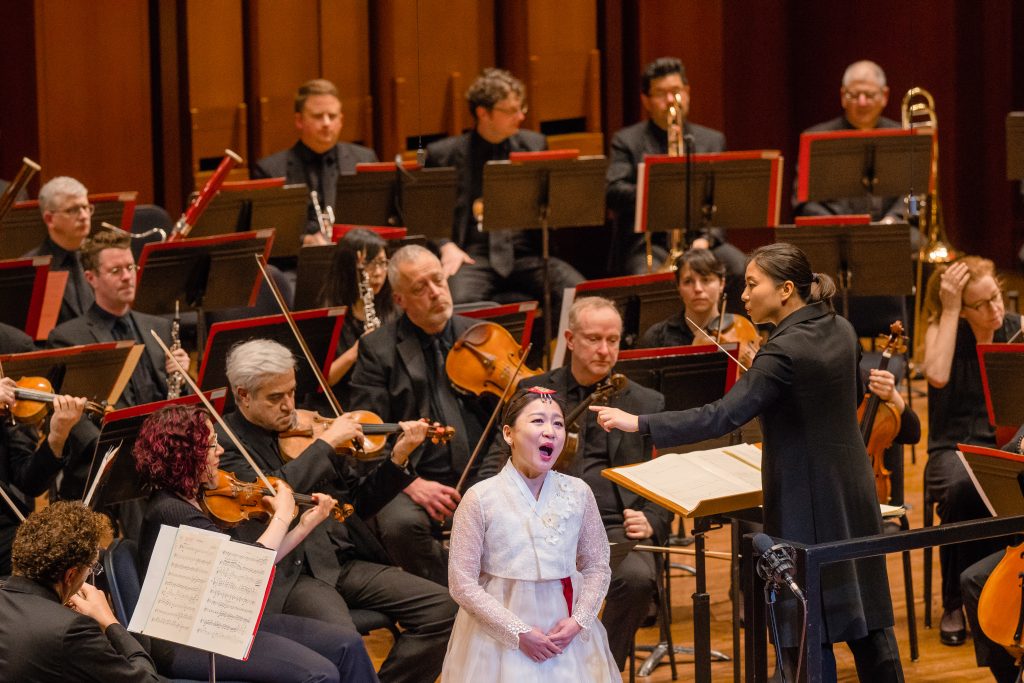By Philippa Kiraly, Special to The Sybaritic Singer
Colorful national dress identified quite a few members of the large Asian presence at the Seattle Symphony’s eleventh “Celebrate Asia” concert Sunday afternoon at Benaroya Hall. Japanese, Indian, Thai, Korean wear represented some of the concert-goers and there were sure to be more nationalities at this lively gathering which lived up to its name, with before and after performances in the lobby by Korean, Chinese and Indian dancers plus Taiko drummers.

The emphasis this year was on Korea, with Korean conductor Shiyeon Sung on the podium, and Korean soprano Kathleen Kim and Korean pianist Seong-Jin Cho as soloists. Their names may not be familiar to Seattleites but Sung and Kim have already made their names elsewhere while Cho, 24, is a rising star.
Cho performed one of the only two western works on the program, Rachmaninov’s Rhapsody on a Theme of Paganini. Both he and the orchestra under Sung gave strikingly crisp performances in the fast sections, with notes clearly delineated and not pounded out. Cho’s impressive technique made this tricky-to-play-well work seem easy as every note came though clean in what appeared to be completely relaxed hands. Beautifully shaped legato passages flowed and he used varying dynamics to good effect. Sung and the orchestra stayed closely with him throughout and never drowned him out. This was not the lushly romantic interpretation we often hear, but one a tad more restrained and also a bit faster, a way to hear it differently which worked.
The audience brought Cho back for an encore, Liszt’s La Campanella from Grandes Études de Paganini, a good choice and equally well played.
John Adams’ largely minimalist The Chairman Dances Foxtrot from his opera Nixon in China was the other Western piece on the program
Every year, there is a “Celebrate Asia” composition competition, this time won by Taiwanese composer Chia-Yin Lin, 28. This is not the first competition she has won and this work, Ascolsia, a six-minute piece receiving its world premiere, used as jumping off point some of the Chinese folk melodies and instruments of the Beiguan style. According to the composer, “Ascolsia” is the combo of three different words the she coined together herself. Ascolta is to listen in Italian. While we know occult to mean mystical and magical in English. The instruments, gongs, woodblocks, small drums and cymbals, gave an otherworldly feel to a work for a modern Western-style orchestra, sometimes like music of the spheres, slow and gently moving with sounds that might be of a forest—bird squawks, brass whines or rumbles– or water, and at others like a busy festival arriving in waves of sound with lots of color. It ended quietly with a long, sustained flute sound continuing on and on. The composer came on stage for plaudits from both orchestra and audience.
For a total contrast to the first half, the second half began with snagS & Snarls, settings by Unsuk Chin of rhymes from Alice in Wonderland out of her opera of that name, but with extra words she added to a couple: nonsense ones to Twinkle, Twinkle Little Star, and increasing complaints of “Wow” from the poor kid in Speak Roughly to your Little Boy. The whole was impish, delightful, fun. Even though it was almost impossible to hear more than a few of the words Kim sang in her open and effortless soprano, her lively gestures indicated much and the words were printed in the program.
Pubbanimitta, by Thai composer Narong Prangcharoen gave a musically graphic description of the beauty of the environment and the increasing disasters to come caused by climate change, all in eight minutes. The title means “foreboding” and that came through clearly in the music.

The concert ended with two songs dear to the heart of Korean people, Arirang and I Miss Mount Keumkang. Kim returned to the stage for these, this time in a beautiful all white formal Korean dress with one red ribbon and a red ornament in her hair. Conductor Sung turned around to encourage the audience to join in, but mostly it didn’t until the last chorus of the mountain song.
Sung directed this program with skill, ease and expressiveness. It would be good to have her back.
 Philippa Kiraly has writing classical music criticism since 1980, for several newspapers in northern Ohio and Seattle, magazines, both local and national, and blogs. She is passionate about the importance of independent criticism for the fine arts, an art in itself which is dying with little interest by many publications and no longer a viable career for most. But writing for tickets is always worthwhile!
Philippa Kiraly has writing classical music criticism since 1980, for several newspapers in northern Ohio and Seattle, magazines, both local and national, and blogs. She is passionate about the importance of independent criticism for the fine arts, an art in itself which is dying with little interest by many publications and no longer a viable career for most. But writing for tickets is always worthwhile!
Pippa is a keen gardener, a keen grandparent, and can get lost in a good book.
